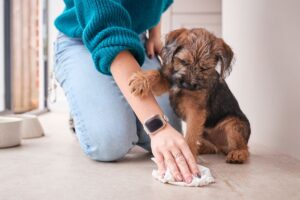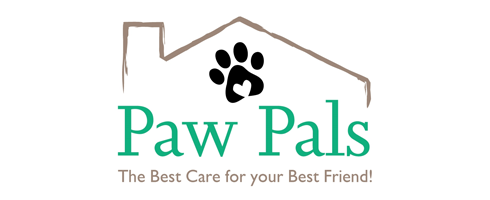Puppies bring joy, boundless energy, and unconditional love, but they also require time, attention, and commitment to training and care—especially during the crucial first few months. Managing puppy care alongside a busy schedule, particularly if you have a full-time job, can be challenging. That’s where Paw Pals’ puppy sitting services can help! Whether you need mid-day visits, extended care, or overnight stays, Paw Pals is here to ensure your puppy receives the attention and care they need while you’re away, giving you peace of mind as you balance work and life with your new furry companion.
Let’s dive into how you can effectively manage caring for a new puppy while juggling work!
Understanding How Long a Puppy Can Be Left Alone
 One important consideration when bringing home a new puppy is how long you can realistically leave them alone. The amount of time they can handle being alone depends largely on the puppy’s age, training, and whether or not they are crate-trained or placed in a safe environment like a puppy pen.
One important consideration when bringing home a new puppy is how long you can realistically leave them alone. The amount of time they can handle being alone depends largely on the puppy’s age, training, and whether or not they are crate-trained or placed in a safe environment like a puppy pen.
8-10 Weeks Old: Minimal Alone Time
Puppies between 8 to 10 weeks old are still in their vulnerable stage where they need constant care, particularly when it comes to bathroom breaks. A puppy this young should be left alone as little as possible since they can quickly become distressed or anxious in your absence. They also need to be let out for potty breaks about every 1-2 hours during the day.
At this stage, it’s a good idea to consider taking a few days off work or arranging for someone to stay with your puppy while you’re gone. This early period is crucial for getting your puppy accustomed to their new environment and establishing trust.
10-12 Weeks Old: Slowly Building Independence
Around this age, a puppy’s bladder capacity starts to increase, but they still need to be let out every two hours. If you absolutely have to leave your puppy home alone for a couple of hours, make sure to set them up in a safe environment like a puppy pen or crate where they can be comfortable and not get into mischief.
3-6 Months Old: Increasing Self-Sufficiency
By this time, most puppies can hold their bladder for three to four hours, though this depends on their individual development. However, this is also the age when many puppies become more curious—and sometimes destructive—if left alone for too long. Crates or pens are advisable at this stage if you’re worried about them getting into trouble while you’re away.
It’s essential to start teaching your puppy to spend small periods alone in order to reduce separation anxiety. Gradually extend these periods until they are comfortable being alone for longer stretches.
What Can You Do When You Have a Full-Time Job?
As much as you’d love to stay home and cuddle with your puppy all day, the reality is that many of us have jobs or other commitments that prevent us from being home for most of the day. Here are several strategies and services that can allow you to care for your puppy while balancing your work responsibilities.
1. Hire Dog Walking Services
 When you have a busy schedule, hiring a professional dog walking service can be a lifesaver. Companies like Paw Pals offer dog walking services designed specifically to provide midday relief for working pet owners.
When you have a busy schedule, hiring a professional dog walking service can be a lifesaver. Companies like Paw Pals offer dog walking services designed specifically to provide midday relief for working pet owners.
Dog walkers can come to your home to spend time with your puppy, giving them much-needed interaction, exercise, and potty breaks. A professional dog walker can also help socialize your puppy by taking them on walks, exposing them to new sights, sounds, and smells. Depending on how much time you want your puppy to spend out of the house, dog walkers can offer different visit lengths—15, 30, or even 45 minutes. For a younger puppy, scheduling longer sessions (30 to 45 minutes) can help reduce their alone time and give them the stimulation they need to stay healthy, happy, and content.
Dog walkers can also assist in feeding, providing fresh water, administering medication, and giving your puppy the attention they crave when you’re not available. Finding a reliable dog walker can make a world of difference for both you and your puppy, ensuring their needs are met while you’re at work.
2. Consider Dog Sitting Services
Sometimes you may need more than just a quick walk for your puppy, especially if you have to leave town for work, or if your job involves frequent travel. For these occasions, dog sitting services can offer you peace of mind.
Paw Pals also provides dog sitting services, where a trained professional comes to your home to care for your puppy. This can include regular scheduled visits (30, 45, or 60 minutes) during which the sitter will feed, walk, and play with your puppy. If you need to be away for an extended period, you can also arrange for an overnight dog sitting service, where the sitter stays at your home for about 12 hours. Overnight stays also come with a 30-minute evening and morning walk.
This type of service ensures your puppy doesn’t feel lonely and provides the consistent care they need, especially during the first six months when training and behavioral development are crucial.
3. Take Extended Lunch Breaks
If you live close to your workplace, consider taking extended lunch breaks to come home and spend some time with your puppy. Even 30 minutes of play, feeding, and a bathroom break can make a huge difference in your puppy’s day. While taking extended lunch breaks every day may not be possible, coupling this approach with professional dog walking services ensures that your puppy is always cared for when you’re unavailable.
4. Maximize Time With Your Puppy During Mornings, Evenings, and Weekends
While puppies need plenty of attention during the day, there’s still ample opportunity to spend quality time with them during the early mornings, evenings, and weekends. A long walk before you head out to work is a perfect way to tire them out so they can take a nap while you’re away.
When you come home at the end of the day, dedicate time for play, snuggling, and training activities. Consistent interaction during these times helps strengthen the bond between you and your puppy.
5. Provide Plenty of Entertainment
Keeping your puppy engaged while they’re home alone is essential to prevent boredom and destructive behavior. Make sure they have access to mentally stimulating toys, such as puzzle toys, chewable treats, or interactive feeders. These toys not only help entertain your puppy but can also help with mental development as they figure out how to retrieve the treat or solve the puzzle.
If possible, rotate their toys regularly to keep things fresh and exciting, ensuring they always have something new to look forward to.
Book Northern Virginia’s Top Puppy Sitters
 Caring for a new puppy while managing a full-time job may seem challenging, but it’s by no means impossible. Hiring dog walking and sitting services, making the most of your breaks, and spending quality time in the mornings and evenings will all help ensure your puppy is well taken care of as they grow into a happy, well-adjusted dog.
Caring for a new puppy while managing a full-time job may seem challenging, but it’s by no means impossible. Hiring dog walking and sitting services, making the most of your breaks, and spending quality time in the mornings and evenings will all help ensure your puppy is well taken care of as they grow into a happy, well-adjusted dog.
If you’re in the Northern Virginia area, Paw Pals offers a range of flexible services to meet both your and your puppy’s needs. Whether it’s for mid-day walks, feeding, or overnight stays, Paw Pals aims to make your puppy’s day (and yours) stress-free. Reach out today to explore how Paw Pals can help you create the perfect care plan for your new puppy!


